An In-Depth Analysis of Dishonest Assistance in Trust Law Cases
VerifiedAdded on 2022/10/04
|9
|2395
|10
Essay
AI Summary
This essay provides a detailed analysis of dishonest assistance within the framework of English trust law. It explores the concept of third-party liability arising from breaches of trust or fiduciary duties, focusing on the 'dishonest state of mind' element. The essay examines key legal precedents, including the cases of Twinsectra Ltd, BCCI bank, Royal Brunei Airlines, Abou-Rahmah, Barlow Clowes International Ltd, and the Ivey case, to illustrate the evolving interpretations of dishonesty and its implications. It discusses the complexities of determining subjective and objective elements in assessing dishonest assistance, highlighting inconsistencies in judicial decisions and the challenges in establishing definitive standards of honesty. The analysis covers the roles of trustees, solicitors, and other third parties, considering their knowledge, actions, and responsibilities in trust-related transactions. The essay delves into the nuances of legal arguments and the impact of case outcomes on trust law principles, offering a comprehensive overview of this complex area of law.
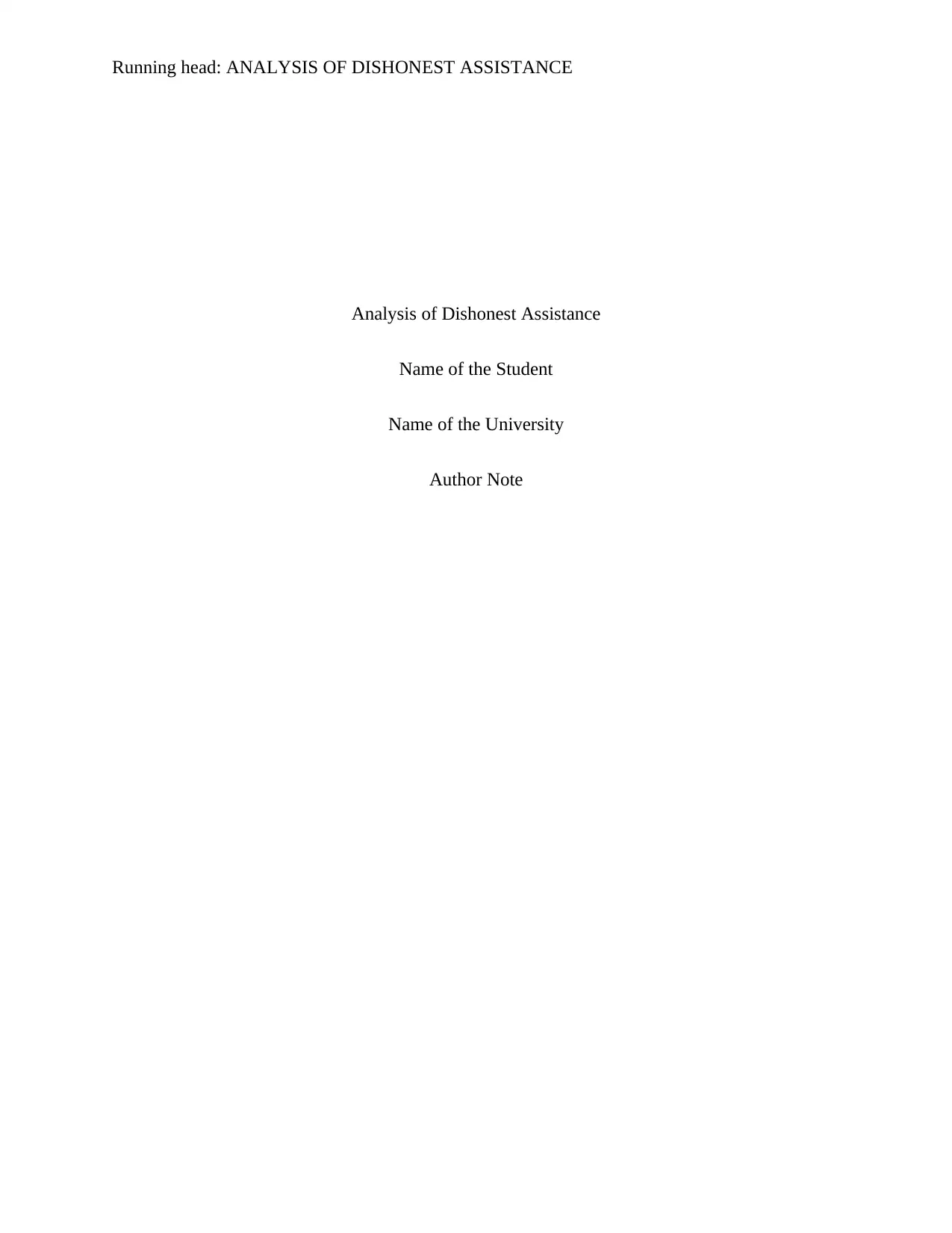
Running head: ANALYSIS OF DISHONEST ASSISTANCE
Analysis of Dishonest Assistance
Name of the Student
Name of the University
Author Note
Analysis of Dishonest Assistance
Name of the Student
Name of the University
Author Note
Paraphrase This Document
Need a fresh take? Get an instant paraphrase of this document with our AI Paraphraser
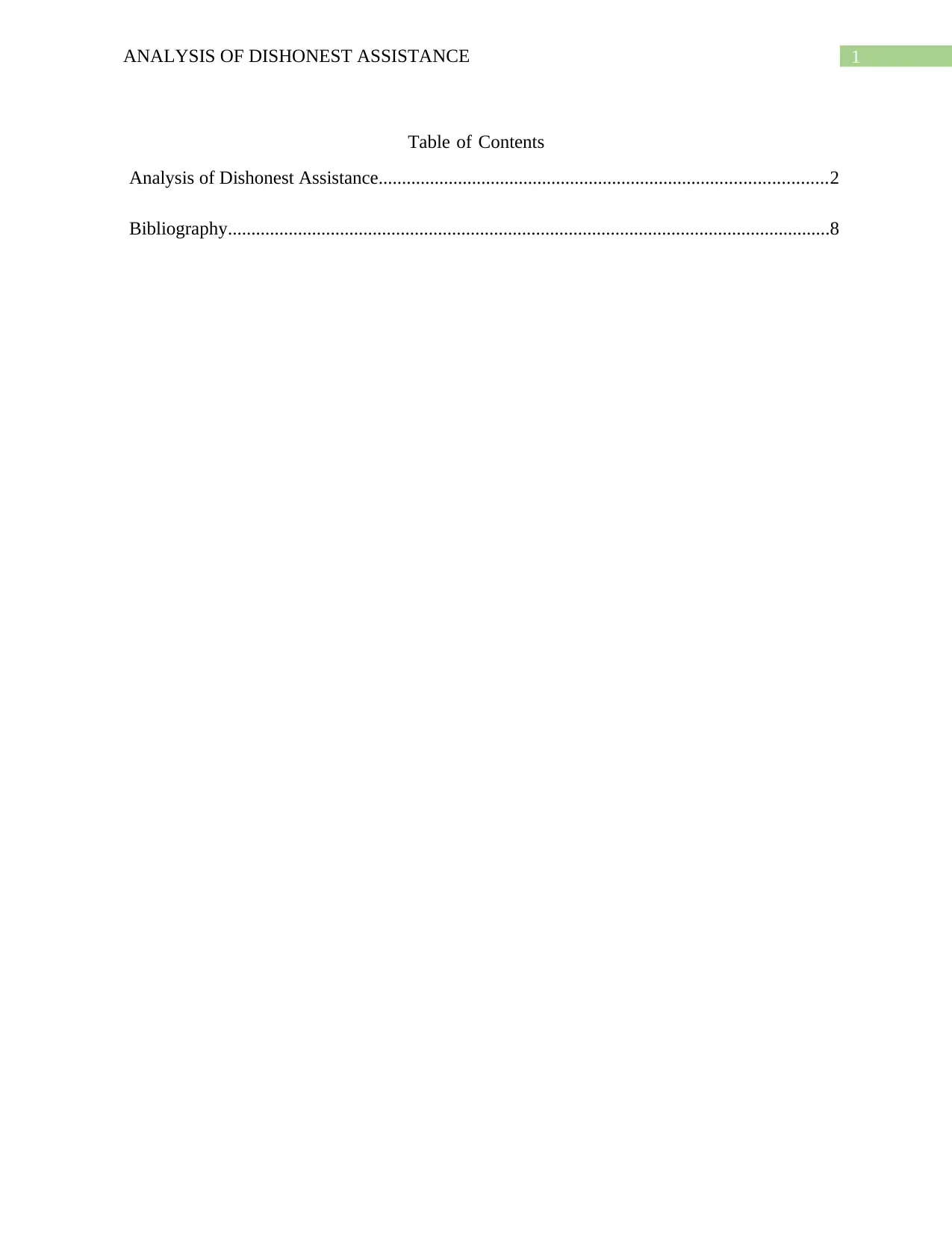
1ANALYSIS OF DISHONEST ASSISTANCE
Table of Contents
Analysis of Dishonest Assistance................................................................................................2
Bibliography.................................................................................................................................8
Table of Contents
Analysis of Dishonest Assistance................................................................................................2
Bibliography.................................................................................................................................8
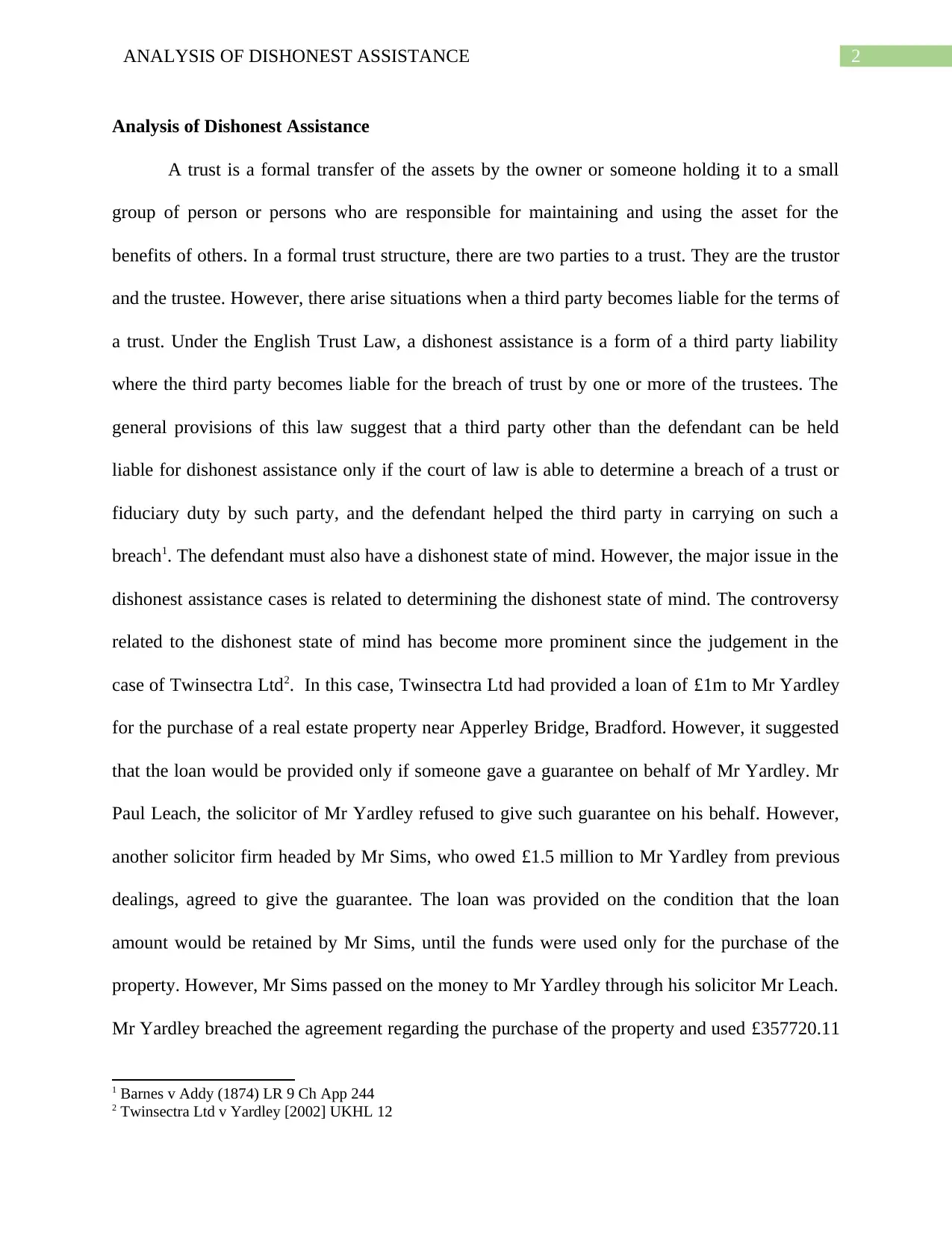
2ANALYSIS OF DISHONEST ASSISTANCE
Analysis of Dishonest Assistance
A trust is a formal transfer of the assets by the owner or someone holding it to a small
group of person or persons who are responsible for maintaining and using the asset for the
benefits of others. In a formal trust structure, there are two parties to a trust. They are the trustor
and the trustee. However, there arise situations when a third party becomes liable for the terms of
a trust. Under the English Trust Law, a dishonest assistance is a form of a third party liability
where the third party becomes liable for the breach of trust by one or more of the trustees. The
general provisions of this law suggest that a third party other than the defendant can be held
liable for dishonest assistance only if the court of law is able to determine a breach of a trust or
fiduciary duty by such party, and the defendant helped the third party in carrying on such a
breach1. The defendant must also have a dishonest state of mind. However, the major issue in the
dishonest assistance cases is related to determining the dishonest state of mind. The controversy
related to the dishonest state of mind has become more prominent since the judgement in the
case of Twinsectra Ltd2. In this case, Twinsectra Ltd had provided a loan of £1m to Mr Yardley
for the purchase of a real estate property near Apperley Bridge, Bradford. However, it suggested
that the loan would be provided only if someone gave a guarantee on behalf of Mr Yardley. Mr
Paul Leach, the solicitor of Mr Yardley refused to give such guarantee on his behalf. However,
another solicitor firm headed by Mr Sims, who owed £1.5 million to Mr Yardley from previous
dealings, agreed to give the guarantee. The loan was provided on the condition that the loan
amount would be retained by Mr Sims, until the funds were used only for the purchase of the
property. However, Mr Sims passed on the money to Mr Yardley through his solicitor Mr Leach.
Mr Yardley breached the agreement regarding the purchase of the property and used £357720.11
1 Barnes v Addy (1874) LR 9 Ch App 244
2 Twinsectra Ltd v Yardley [2002] UKHL 12
Analysis of Dishonest Assistance
A trust is a formal transfer of the assets by the owner or someone holding it to a small
group of person or persons who are responsible for maintaining and using the asset for the
benefits of others. In a formal trust structure, there are two parties to a trust. They are the trustor
and the trustee. However, there arise situations when a third party becomes liable for the terms of
a trust. Under the English Trust Law, a dishonest assistance is a form of a third party liability
where the third party becomes liable for the breach of trust by one or more of the trustees. The
general provisions of this law suggest that a third party other than the defendant can be held
liable for dishonest assistance only if the court of law is able to determine a breach of a trust or
fiduciary duty by such party, and the defendant helped the third party in carrying on such a
breach1. The defendant must also have a dishonest state of mind. However, the major issue in the
dishonest assistance cases is related to determining the dishonest state of mind. The controversy
related to the dishonest state of mind has become more prominent since the judgement in the
case of Twinsectra Ltd2. In this case, Twinsectra Ltd had provided a loan of £1m to Mr Yardley
for the purchase of a real estate property near Apperley Bridge, Bradford. However, it suggested
that the loan would be provided only if someone gave a guarantee on behalf of Mr Yardley. Mr
Paul Leach, the solicitor of Mr Yardley refused to give such guarantee on his behalf. However,
another solicitor firm headed by Mr Sims, who owed £1.5 million to Mr Yardley from previous
dealings, agreed to give the guarantee. The loan was provided on the condition that the loan
amount would be retained by Mr Sims, until the funds were used only for the purchase of the
property. However, Mr Sims passed on the money to Mr Yardley through his solicitor Mr Leach.
Mr Yardley breached the agreement regarding the purchase of the property and used £357720.11
1 Barnes v Addy (1874) LR 9 Ch App 244
2 Twinsectra Ltd v Yardley [2002] UKHL 12
⊘ This is a preview!⊘
Do you want full access?
Subscribe today to unlock all pages.

Trusted by 1+ million students worldwide
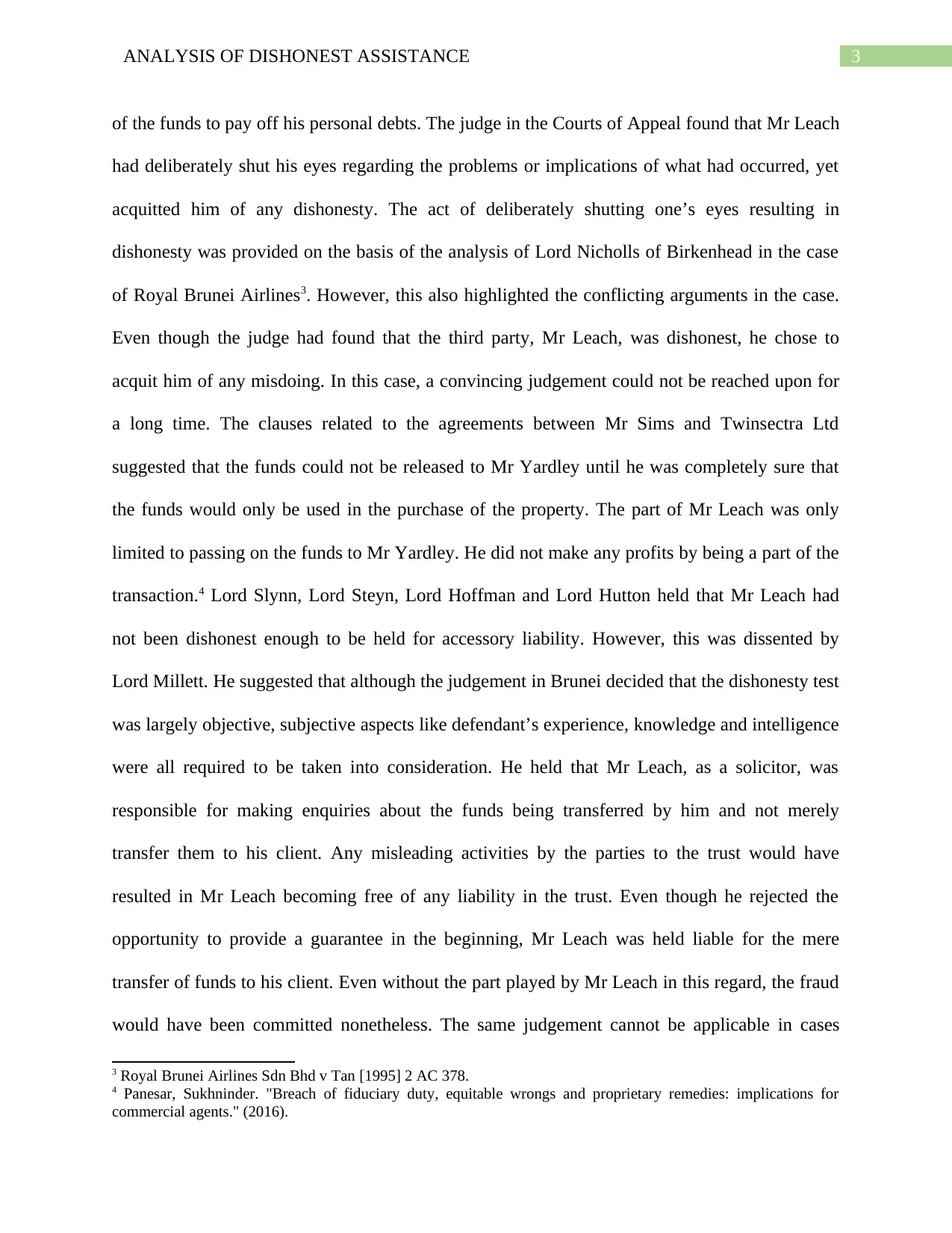
3ANALYSIS OF DISHONEST ASSISTANCE
of the funds to pay off his personal debts. The judge in the Courts of Appeal found that Mr Leach
had deliberately shut his eyes regarding the problems or implications of what had occurred, yet
acquitted him of any dishonesty. The act of deliberately shutting one’s eyes resulting in
dishonesty was provided on the basis of the analysis of Lord Nicholls of Birkenhead in the case
of Royal Brunei Airlines3. However, this also highlighted the conflicting arguments in the case.
Even though the judge had found that the third party, Mr Leach, was dishonest, he chose to
acquit him of any misdoing. In this case, a convincing judgement could not be reached upon for
a long time. The clauses related to the agreements between Mr Sims and Twinsectra Ltd
suggested that the funds could not be released to Mr Yardley until he was completely sure that
the funds would only be used in the purchase of the property. The part of Mr Leach was only
limited to passing on the funds to Mr Yardley. He did not make any profits by being a part of the
transaction.4 Lord Slynn, Lord Steyn, Lord Hoffman and Lord Hutton held that Mr Leach had
not been dishonest enough to be held for accessory liability. However, this was dissented by
Lord Millett. He suggested that although the judgement in Brunei decided that the dishonesty test
was largely objective, subjective aspects like defendant’s experience, knowledge and intelligence
were all required to be taken into consideration. He held that Mr Leach, as a solicitor, was
responsible for making enquiries about the funds being transferred by him and not merely
transfer them to his client. Any misleading activities by the parties to the trust would have
resulted in Mr Leach becoming free of any liability in the trust. Even though he rejected the
opportunity to provide a guarantee in the beginning, Mr Leach was held liable for the mere
transfer of funds to his client. Even without the part played by Mr Leach in this regard, the fraud
would have been committed nonetheless. The same judgement cannot be applicable in cases
3 Royal Brunei Airlines Sdn Bhd v Tan [1995] 2 AC 378.
4 Panesar, Sukhninder. "Breach of fiduciary duty, equitable wrongs and proprietary remedies: implications for
commercial agents." (2016).
of the funds to pay off his personal debts. The judge in the Courts of Appeal found that Mr Leach
had deliberately shut his eyes regarding the problems or implications of what had occurred, yet
acquitted him of any dishonesty. The act of deliberately shutting one’s eyes resulting in
dishonesty was provided on the basis of the analysis of Lord Nicholls of Birkenhead in the case
of Royal Brunei Airlines3. However, this also highlighted the conflicting arguments in the case.
Even though the judge had found that the third party, Mr Leach, was dishonest, he chose to
acquit him of any misdoing. In this case, a convincing judgement could not be reached upon for
a long time. The clauses related to the agreements between Mr Sims and Twinsectra Ltd
suggested that the funds could not be released to Mr Yardley until he was completely sure that
the funds would only be used in the purchase of the property. The part of Mr Leach was only
limited to passing on the funds to Mr Yardley. He did not make any profits by being a part of the
transaction.4 Lord Slynn, Lord Steyn, Lord Hoffman and Lord Hutton held that Mr Leach had
not been dishonest enough to be held for accessory liability. However, this was dissented by
Lord Millett. He suggested that although the judgement in Brunei decided that the dishonesty test
was largely objective, subjective aspects like defendant’s experience, knowledge and intelligence
were all required to be taken into consideration. He held that Mr Leach, as a solicitor, was
responsible for making enquiries about the funds being transferred by him and not merely
transfer them to his client. Any misleading activities by the parties to the trust would have
resulted in Mr Leach becoming free of any liability in the trust. Even though he rejected the
opportunity to provide a guarantee in the beginning, Mr Leach was held liable for the mere
transfer of funds to his client. Even without the part played by Mr Leach in this regard, the fraud
would have been committed nonetheless. The same judgement cannot be applicable in cases
3 Royal Brunei Airlines Sdn Bhd v Tan [1995] 2 AC 378.
4 Panesar, Sukhninder. "Breach of fiduciary duty, equitable wrongs and proprietary remedies: implications for
commercial agents." (2016).
Paraphrase This Document
Need a fresh take? Get an instant paraphrase of this document with our AI Paraphraser
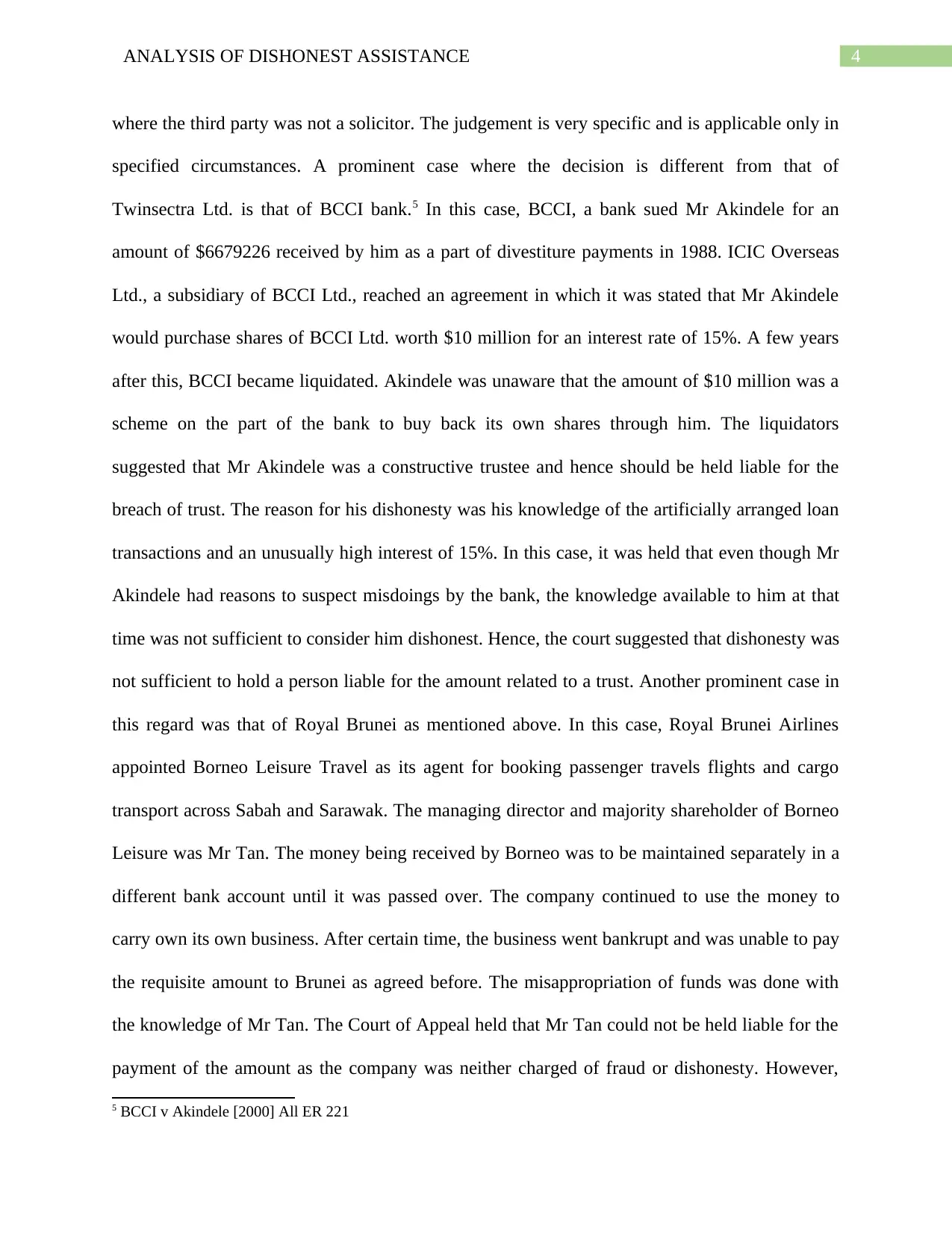
4ANALYSIS OF DISHONEST ASSISTANCE
where the third party was not a solicitor. The judgement is very specific and is applicable only in
specified circumstances. A prominent case where the decision is different from that of
Twinsectra Ltd. is that of BCCI bank.5 In this case, BCCI, a bank sued Mr Akindele for an
amount of $6679226 received by him as a part of divestiture payments in 1988. ICIC Overseas
Ltd., a subsidiary of BCCI Ltd., reached an agreement in which it was stated that Mr Akindele
would purchase shares of BCCI Ltd. worth $10 million for an interest rate of 15%. A few years
after this, BCCI became liquidated. Akindele was unaware that the amount of $10 million was a
scheme on the part of the bank to buy back its own shares through him. The liquidators
suggested that Mr Akindele was a constructive trustee and hence should be held liable for the
breach of trust. The reason for his dishonesty was his knowledge of the artificially arranged loan
transactions and an unusually high interest of 15%. In this case, it was held that even though Mr
Akindele had reasons to suspect misdoings by the bank, the knowledge available to him at that
time was not sufficient to consider him dishonest. Hence, the court suggested that dishonesty was
not sufficient to hold a person liable for the amount related to a trust. Another prominent case in
this regard was that of Royal Brunei as mentioned above. In this case, Royal Brunei Airlines
appointed Borneo Leisure Travel as its agent for booking passenger travels flights and cargo
transport across Sabah and Sarawak. The managing director and majority shareholder of Borneo
Leisure was Mr Tan. The money being received by Borneo was to be maintained separately in a
different bank account until it was passed over. The company continued to use the money to
carry own its own business. After certain time, the business went bankrupt and was unable to pay
the requisite amount to Brunei as agreed before. The misappropriation of funds was done with
the knowledge of Mr Tan. The Court of Appeal held that Mr Tan could not be held liable for the
payment of the amount as the company was neither charged of fraud or dishonesty. However,
5 BCCI v Akindele [2000] All ER 221
where the third party was not a solicitor. The judgement is very specific and is applicable only in
specified circumstances. A prominent case where the decision is different from that of
Twinsectra Ltd. is that of BCCI bank.5 In this case, BCCI, a bank sued Mr Akindele for an
amount of $6679226 received by him as a part of divestiture payments in 1988. ICIC Overseas
Ltd., a subsidiary of BCCI Ltd., reached an agreement in which it was stated that Mr Akindele
would purchase shares of BCCI Ltd. worth $10 million for an interest rate of 15%. A few years
after this, BCCI became liquidated. Akindele was unaware that the amount of $10 million was a
scheme on the part of the bank to buy back its own shares through him. The liquidators
suggested that Mr Akindele was a constructive trustee and hence should be held liable for the
breach of trust. The reason for his dishonesty was his knowledge of the artificially arranged loan
transactions and an unusually high interest of 15%. In this case, it was held that even though Mr
Akindele had reasons to suspect misdoings by the bank, the knowledge available to him at that
time was not sufficient to consider him dishonest. Hence, the court suggested that dishonesty was
not sufficient to hold a person liable for the amount related to a trust. Another prominent case in
this regard was that of Royal Brunei as mentioned above. In this case, Royal Brunei Airlines
appointed Borneo Leisure Travel as its agent for booking passenger travels flights and cargo
transport across Sabah and Sarawak. The managing director and majority shareholder of Borneo
Leisure was Mr Tan. The money being received by Borneo was to be maintained separately in a
different bank account until it was passed over. The company continued to use the money to
carry own its own business. After certain time, the business went bankrupt and was unable to pay
the requisite amount to Brunei as agreed before. The misappropriation of funds was done with
the knowledge of Mr Tan. The Court of Appeal held that Mr Tan could not be held liable for the
payment of the amount as the company was neither charged of fraud or dishonesty. However,
5 BCCI v Akindele [2000] All ER 221
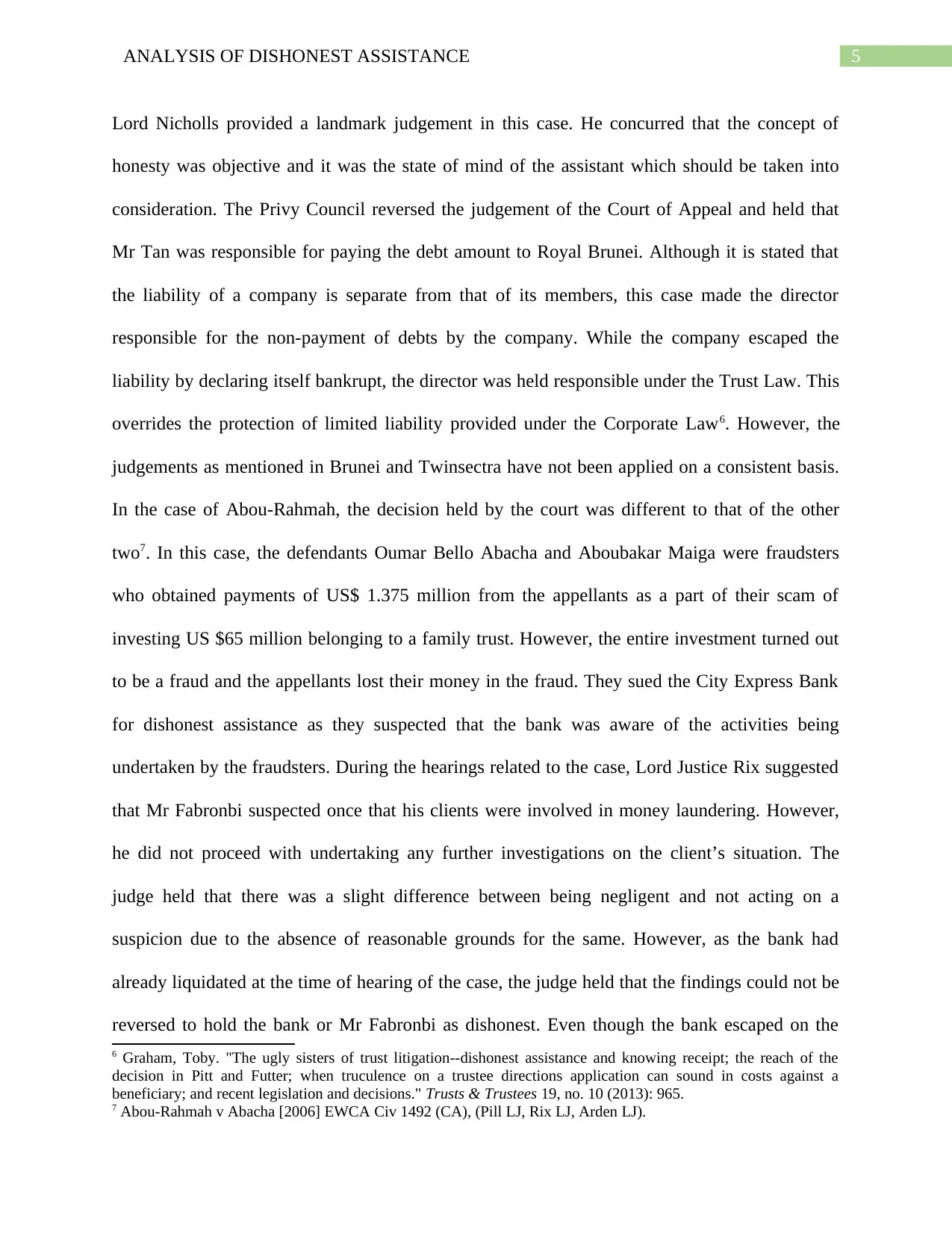
5ANALYSIS OF DISHONEST ASSISTANCE
Lord Nicholls provided a landmark judgement in this case. He concurred that the concept of
honesty was objective and it was the state of mind of the assistant which should be taken into
consideration. The Privy Council reversed the judgement of the Court of Appeal and held that
Mr Tan was responsible for paying the debt amount to Royal Brunei. Although it is stated that
the liability of a company is separate from that of its members, this case made the director
responsible for the non-payment of debts by the company. While the company escaped the
liability by declaring itself bankrupt, the director was held responsible under the Trust Law. This
overrides the protection of limited liability provided under the Corporate Law6. However, the
judgements as mentioned in Brunei and Twinsectra have not been applied on a consistent basis.
In the case of Abou-Rahmah, the decision held by the court was different to that of the other
two7. In this case, the defendants Oumar Bello Abacha and Aboubakar Maiga were fraudsters
who obtained payments of US$ 1.375 million from the appellants as a part of their scam of
investing US $65 million belonging to a family trust. However, the entire investment turned out
to be a fraud and the appellants lost their money in the fraud. They sued the City Express Bank
for dishonest assistance as they suspected that the bank was aware of the activities being
undertaken by the fraudsters. During the hearings related to the case, Lord Justice Rix suggested
that Mr Fabronbi suspected once that his clients were involved in money laundering. However,
he did not proceed with undertaking any further investigations on the client’s situation. The
judge held that there was a slight difference between being negligent and not acting on a
suspicion due to the absence of reasonable grounds for the same. However, as the bank had
already liquidated at the time of hearing of the case, the judge held that the findings could not be
reversed to hold the bank or Mr Fabronbi as dishonest. Even though the bank escaped on the
6 Graham, Toby. "The ugly sisters of trust litigation--dishonest assistance and knowing receipt; the reach of the
decision in Pitt and Futter; when truculence on a trustee directions application can sound in costs against a
beneficiary; and recent legislation and decisions." Trusts & Trustees 19, no. 10 (2013): 965.
7 Abou-Rahmah v Abacha [2006] EWCA Civ 1492 (CA), (Pill LJ, Rix LJ, Arden LJ).
Lord Nicholls provided a landmark judgement in this case. He concurred that the concept of
honesty was objective and it was the state of mind of the assistant which should be taken into
consideration. The Privy Council reversed the judgement of the Court of Appeal and held that
Mr Tan was responsible for paying the debt amount to Royal Brunei. Although it is stated that
the liability of a company is separate from that of its members, this case made the director
responsible for the non-payment of debts by the company. While the company escaped the
liability by declaring itself bankrupt, the director was held responsible under the Trust Law. This
overrides the protection of limited liability provided under the Corporate Law6. However, the
judgements as mentioned in Brunei and Twinsectra have not been applied on a consistent basis.
In the case of Abou-Rahmah, the decision held by the court was different to that of the other
two7. In this case, the defendants Oumar Bello Abacha and Aboubakar Maiga were fraudsters
who obtained payments of US$ 1.375 million from the appellants as a part of their scam of
investing US $65 million belonging to a family trust. However, the entire investment turned out
to be a fraud and the appellants lost their money in the fraud. They sued the City Express Bank
for dishonest assistance as they suspected that the bank was aware of the activities being
undertaken by the fraudsters. During the hearings related to the case, Lord Justice Rix suggested
that Mr Fabronbi suspected once that his clients were involved in money laundering. However,
he did not proceed with undertaking any further investigations on the client’s situation. The
judge held that there was a slight difference between being negligent and not acting on a
suspicion due to the absence of reasonable grounds for the same. However, as the bank had
already liquidated at the time of hearing of the case, the judge held that the findings could not be
reversed to hold the bank or Mr Fabronbi as dishonest. Even though the bank escaped on the
6 Graham, Toby. "The ugly sisters of trust litigation--dishonest assistance and knowing receipt; the reach of the
decision in Pitt and Futter; when truculence on a trustee directions application can sound in costs against a
beneficiary; and recent legislation and decisions." Trusts & Trustees 19, no. 10 (2013): 965.
7 Abou-Rahmah v Abacha [2006] EWCA Civ 1492 (CA), (Pill LJ, Rix LJ, Arden LJ).
⊘ This is a preview!⊘
Do you want full access?
Subscribe today to unlock all pages.

Trusted by 1+ million students worldwide
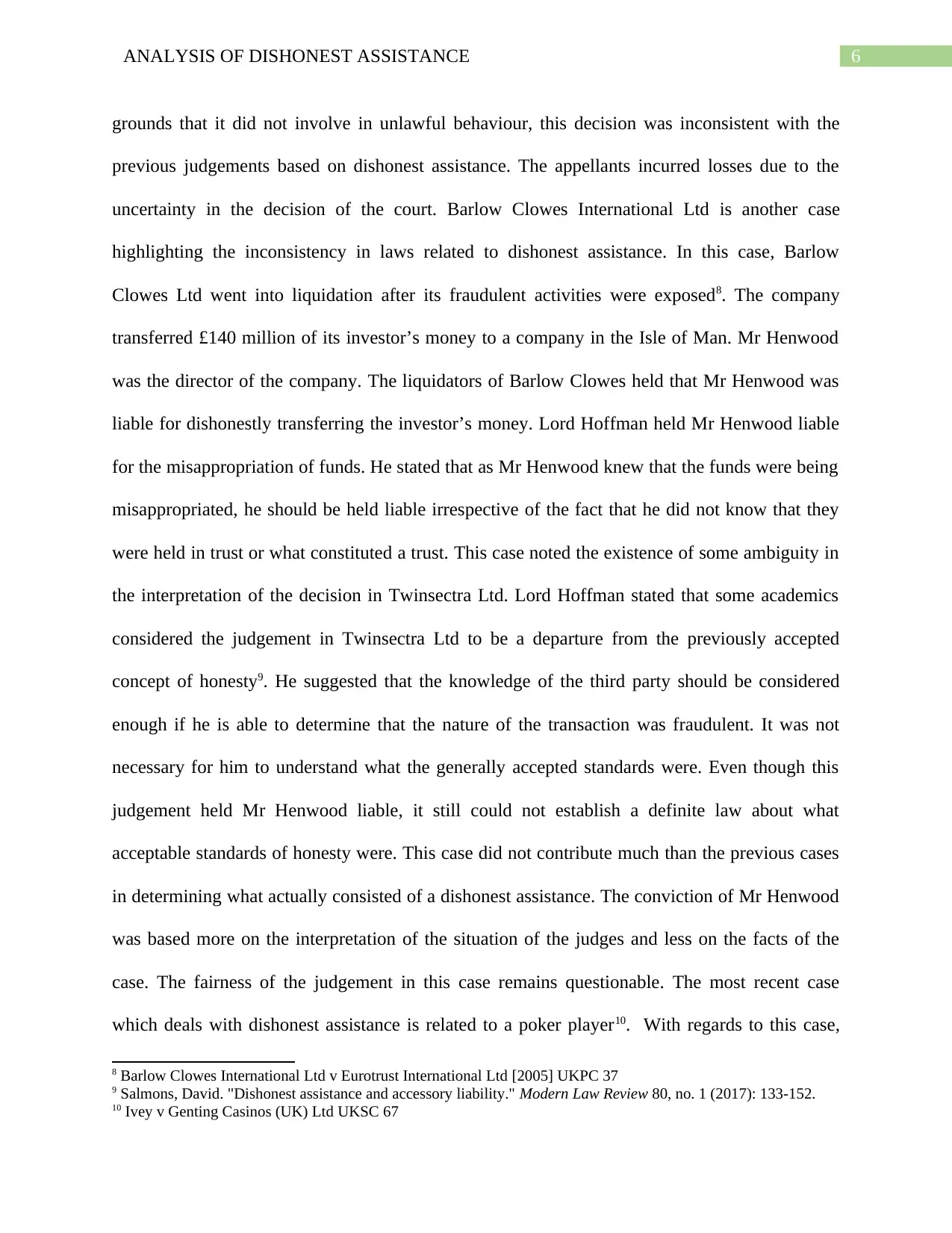
6ANALYSIS OF DISHONEST ASSISTANCE
grounds that it did not involve in unlawful behaviour, this decision was inconsistent with the
previous judgements based on dishonest assistance. The appellants incurred losses due to the
uncertainty in the decision of the court. Barlow Clowes International Ltd is another case
highlighting the inconsistency in laws related to dishonest assistance. In this case, Barlow
Clowes Ltd went into liquidation after its fraudulent activities were exposed8. The company
transferred £140 million of its investor’s money to a company in the Isle of Man. Mr Henwood
was the director of the company. The liquidators of Barlow Clowes held that Mr Henwood was
liable for dishonestly transferring the investor’s money. Lord Hoffman held Mr Henwood liable
for the misappropriation of funds. He stated that as Mr Henwood knew that the funds were being
misappropriated, he should be held liable irrespective of the fact that he did not know that they
were held in trust or what constituted a trust. This case noted the existence of some ambiguity in
the interpretation of the decision in Twinsectra Ltd. Lord Hoffman stated that some academics
considered the judgement in Twinsectra Ltd to be a departure from the previously accepted
concept of honesty9. He suggested that the knowledge of the third party should be considered
enough if he is able to determine that the nature of the transaction was fraudulent. It was not
necessary for him to understand what the generally accepted standards were. Even though this
judgement held Mr Henwood liable, it still could not establish a definite law about what
acceptable standards of honesty were. This case did not contribute much than the previous cases
in determining what actually consisted of a dishonest assistance. The conviction of Mr Henwood
was based more on the interpretation of the situation of the judges and less on the facts of the
case. The fairness of the judgement in this case remains questionable. The most recent case
which deals with dishonest assistance is related to a poker player10. With regards to this case,
8 Barlow Clowes International Ltd v Eurotrust International Ltd [2005] UKPC 37
9 Salmons, David. "Dishonest assistance and accessory liability." Modern Law Review 80, no. 1 (2017): 133-152.
10 Ivey v Genting Casinos (UK) Ltd UKSC 67
grounds that it did not involve in unlawful behaviour, this decision was inconsistent with the
previous judgements based on dishonest assistance. The appellants incurred losses due to the
uncertainty in the decision of the court. Barlow Clowes International Ltd is another case
highlighting the inconsistency in laws related to dishonest assistance. In this case, Barlow
Clowes Ltd went into liquidation after its fraudulent activities were exposed8. The company
transferred £140 million of its investor’s money to a company in the Isle of Man. Mr Henwood
was the director of the company. The liquidators of Barlow Clowes held that Mr Henwood was
liable for dishonestly transferring the investor’s money. Lord Hoffman held Mr Henwood liable
for the misappropriation of funds. He stated that as Mr Henwood knew that the funds were being
misappropriated, he should be held liable irrespective of the fact that he did not know that they
were held in trust or what constituted a trust. This case noted the existence of some ambiguity in
the interpretation of the decision in Twinsectra Ltd. Lord Hoffman stated that some academics
considered the judgement in Twinsectra Ltd to be a departure from the previously accepted
concept of honesty9. He suggested that the knowledge of the third party should be considered
enough if he is able to determine that the nature of the transaction was fraudulent. It was not
necessary for him to understand what the generally accepted standards were. Even though this
judgement held Mr Henwood liable, it still could not establish a definite law about what
acceptable standards of honesty were. This case did not contribute much than the previous cases
in determining what actually consisted of a dishonest assistance. The conviction of Mr Henwood
was based more on the interpretation of the situation of the judges and less on the facts of the
case. The fairness of the judgement in this case remains questionable. The most recent case
which deals with dishonest assistance is related to a poker player10. With regards to this case,
8 Barlow Clowes International Ltd v Eurotrust International Ltd [2005] UKPC 37
9 Salmons, David. "Dishonest assistance and accessory liability." Modern Law Review 80, no. 1 (2017): 133-152.
10 Ivey v Genting Casinos (UK) Ltd UKSC 67
Paraphrase This Document
Need a fresh take? Get an instant paraphrase of this document with our AI Paraphraser
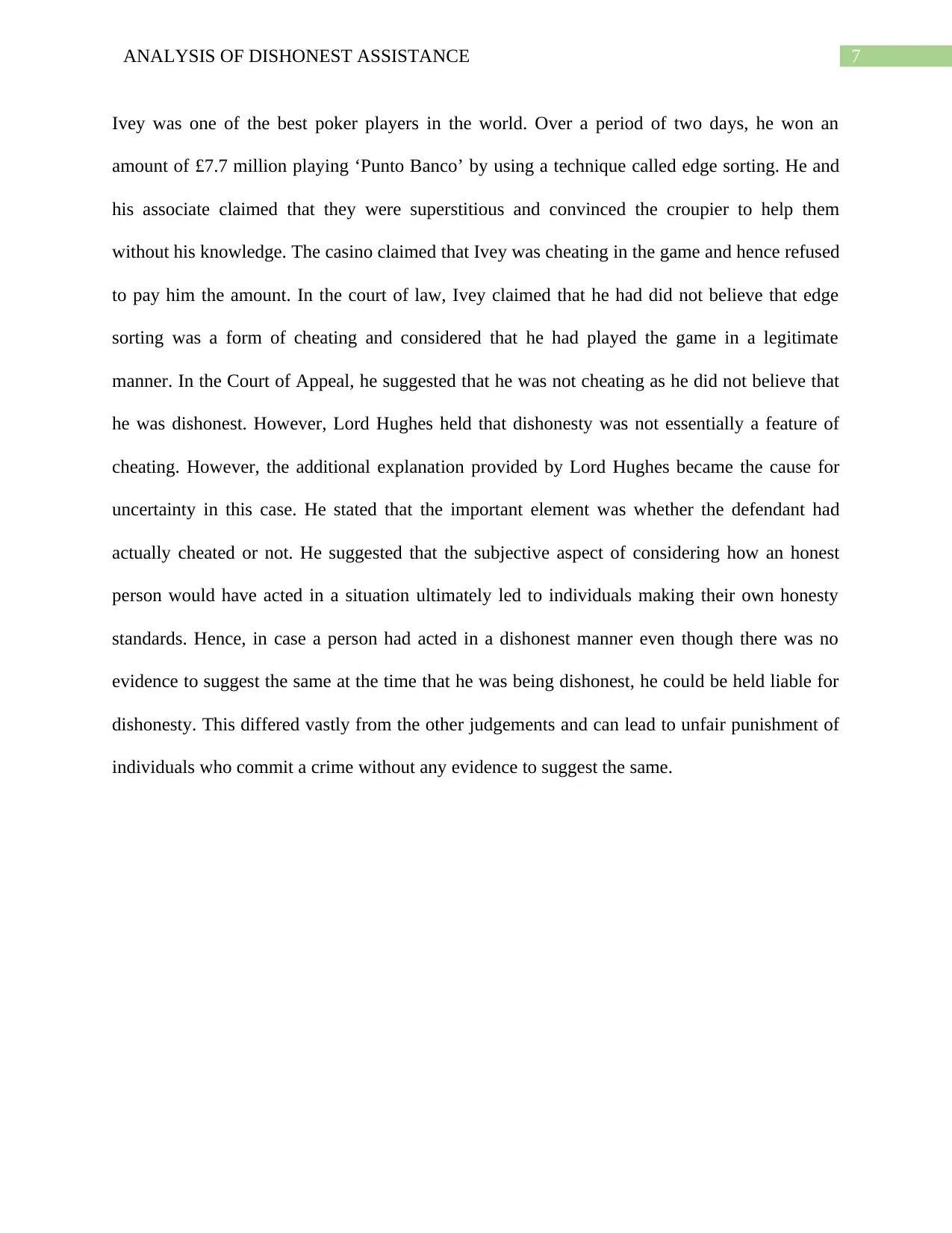
7ANALYSIS OF DISHONEST ASSISTANCE
Ivey was one of the best poker players in the world. Over a period of two days, he won an
amount of £7.7 million playing ‘Punto Banco’ by using a technique called edge sorting. He and
his associate claimed that they were superstitious and convinced the croupier to help them
without his knowledge. The casino claimed that Ivey was cheating in the game and hence refused
to pay him the amount. In the court of law, Ivey claimed that he had did not believe that edge
sorting was a form of cheating and considered that he had played the game in a legitimate
manner. In the Court of Appeal, he suggested that he was not cheating as he did not believe that
he was dishonest. However, Lord Hughes held that dishonesty was not essentially a feature of
cheating. However, the additional explanation provided by Lord Hughes became the cause for
uncertainty in this case. He stated that the important element was whether the defendant had
actually cheated or not. He suggested that the subjective aspect of considering how an honest
person would have acted in a situation ultimately led to individuals making their own honesty
standards. Hence, in case a person had acted in a dishonest manner even though there was no
evidence to suggest the same at the time that he was being dishonest, he could be held liable for
dishonesty. This differed vastly from the other judgements and can lead to unfair punishment of
individuals who commit a crime without any evidence to suggest the same.
Ivey was one of the best poker players in the world. Over a period of two days, he won an
amount of £7.7 million playing ‘Punto Banco’ by using a technique called edge sorting. He and
his associate claimed that they were superstitious and convinced the croupier to help them
without his knowledge. The casino claimed that Ivey was cheating in the game and hence refused
to pay him the amount. In the court of law, Ivey claimed that he had did not believe that edge
sorting was a form of cheating and considered that he had played the game in a legitimate
manner. In the Court of Appeal, he suggested that he was not cheating as he did not believe that
he was dishonest. However, Lord Hughes held that dishonesty was not essentially a feature of
cheating. However, the additional explanation provided by Lord Hughes became the cause for
uncertainty in this case. He stated that the important element was whether the defendant had
actually cheated or not. He suggested that the subjective aspect of considering how an honest
person would have acted in a situation ultimately led to individuals making their own honesty
standards. Hence, in case a person had acted in a dishonest manner even though there was no
evidence to suggest the same at the time that he was being dishonest, he could be held liable for
dishonesty. This differed vastly from the other judgements and can lead to unfair punishment of
individuals who commit a crime without any evidence to suggest the same.
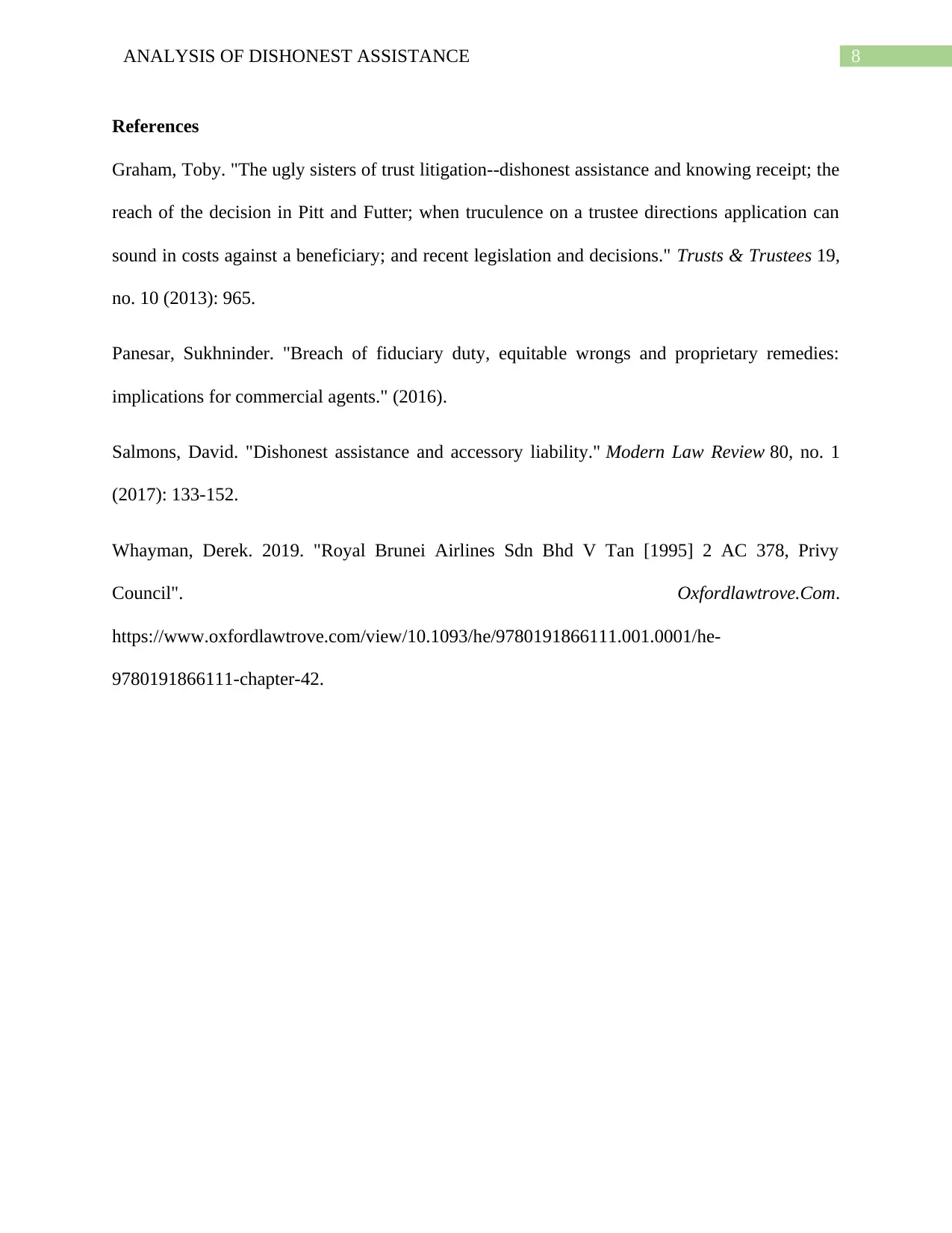
8ANALYSIS OF DISHONEST ASSISTANCE
References
Graham, Toby. "The ugly sisters of trust litigation--dishonest assistance and knowing receipt; the
reach of the decision in Pitt and Futter; when truculence on a trustee directions application can
sound in costs against a beneficiary; and recent legislation and decisions." Trusts & Trustees 19,
no. 10 (2013): 965.
Panesar, Sukhninder. "Breach of fiduciary duty, equitable wrongs and proprietary remedies:
implications for commercial agents." (2016).
Salmons, David. "Dishonest assistance and accessory liability." Modern Law Review 80, no. 1
(2017): 133-152.
Whayman, Derek. 2019. "Royal Brunei Airlines Sdn Bhd V Tan [1995] 2 AC 378, Privy
Council". Oxfordlawtrove.Com.
https://www.oxfordlawtrove.com/view/10.1093/he/9780191866111.001.0001/he-
9780191866111-chapter-42.
References
Graham, Toby. "The ugly sisters of trust litigation--dishonest assistance and knowing receipt; the
reach of the decision in Pitt and Futter; when truculence on a trustee directions application can
sound in costs against a beneficiary; and recent legislation and decisions." Trusts & Trustees 19,
no. 10 (2013): 965.
Panesar, Sukhninder. "Breach of fiduciary duty, equitable wrongs and proprietary remedies:
implications for commercial agents." (2016).
Salmons, David. "Dishonest assistance and accessory liability." Modern Law Review 80, no. 1
(2017): 133-152.
Whayman, Derek. 2019. "Royal Brunei Airlines Sdn Bhd V Tan [1995] 2 AC 378, Privy
Council". Oxfordlawtrove.Com.
https://www.oxfordlawtrove.com/view/10.1093/he/9780191866111.001.0001/he-
9780191866111-chapter-42.
⊘ This is a preview!⊘
Do you want full access?
Subscribe today to unlock all pages.

Trusted by 1+ million students worldwide
1 out of 9
Your All-in-One AI-Powered Toolkit for Academic Success.
+13062052269
info@desklib.com
Available 24*7 on WhatsApp / Email
![[object Object]](/_next/static/media/star-bottom.7253800d.svg)
Unlock your academic potential
Copyright © 2020–2026 A2Z Services. All Rights Reserved. Developed and managed by ZUCOL.
